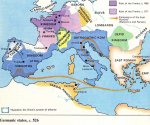Not sure if this counts as a proper historical phenomenon with a name that eludes me —if it even has a name—, but I did notice that while normal empires built over the span of generations by determined colonialists oppressing and exploiting whole nations, there also exists the cases of men building polities that exists as empires of sorts but crash upon either their deaths or a concerted military effort against them.
The methodology through which such Personal Empires are acquired is often a combination of inheritance and conquest, the most famous examples being Hitler, Napoleon, Alexander and Charles V, though smaller and lesser known examples do exists, from Harsha of Kannauj in India and Theodoric the Great (who unified Gothic Crowns*)to condottieri in the vein of Gian Galeazzo Visconti, Mastino Scaligeri and Cesare Borgia who tried and failed to consolidate great domains in Northern Italy.
And of course, men like Charles of Anjou with their weird and unsustainable collection of properties.
*
But what other men could have accomplished this feat of uniting such separate peoples and crowns under their very temporary yoke, either through conquest, marriage or inheritance, that did not do so IRL?
The methodology through which such Personal Empires are acquired is often a combination of inheritance and conquest, the most famous examples being Hitler, Napoleon, Alexander and Charles V, though smaller and lesser known examples do exists, from Harsha of Kannauj in India and Theodoric the Great (who unified Gothic Crowns*)to condottieri in the vein of Gian Galeazzo Visconti, Mastino Scaligeri and Cesare Borgia who tried and failed to consolidate great domains in Northern Italy.
And of course, men like Charles of Anjou with their weird and unsustainable collection of properties.

*

But what other men could have accomplished this feat of uniting such separate peoples and crowns under their very temporary yoke, either through conquest, marriage or inheritance, that did not do so IRL?
Last edited:

